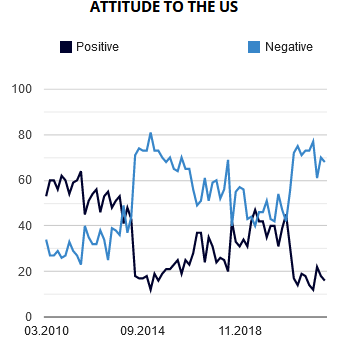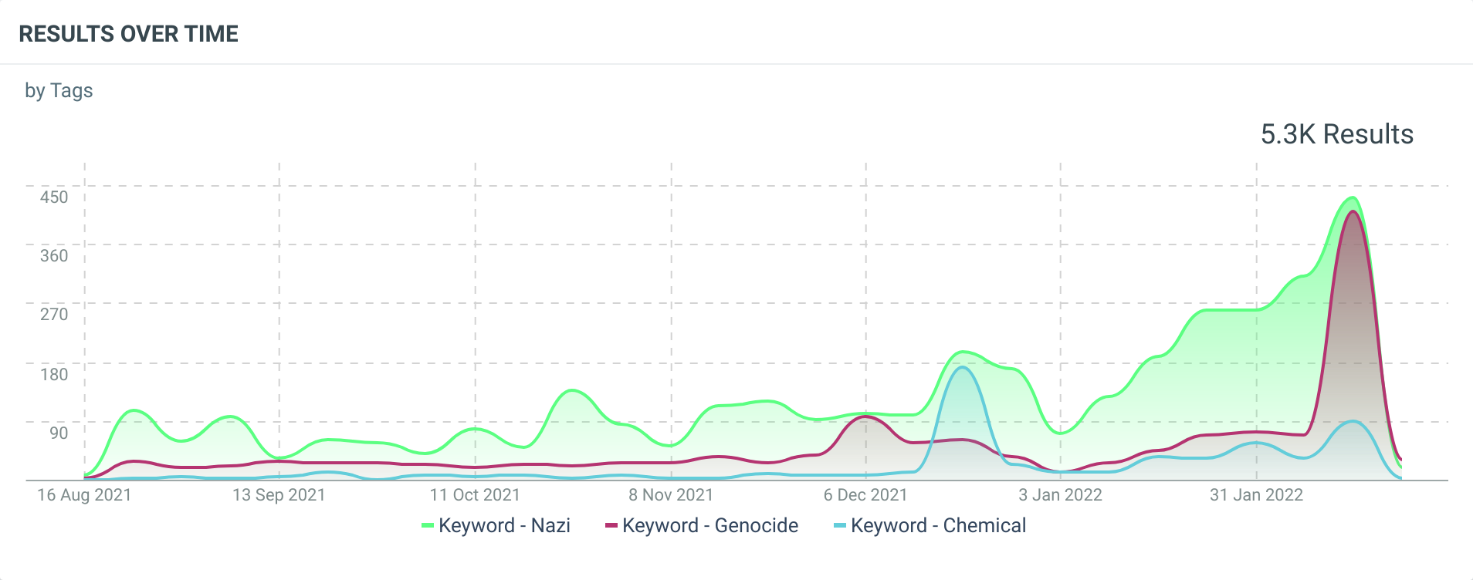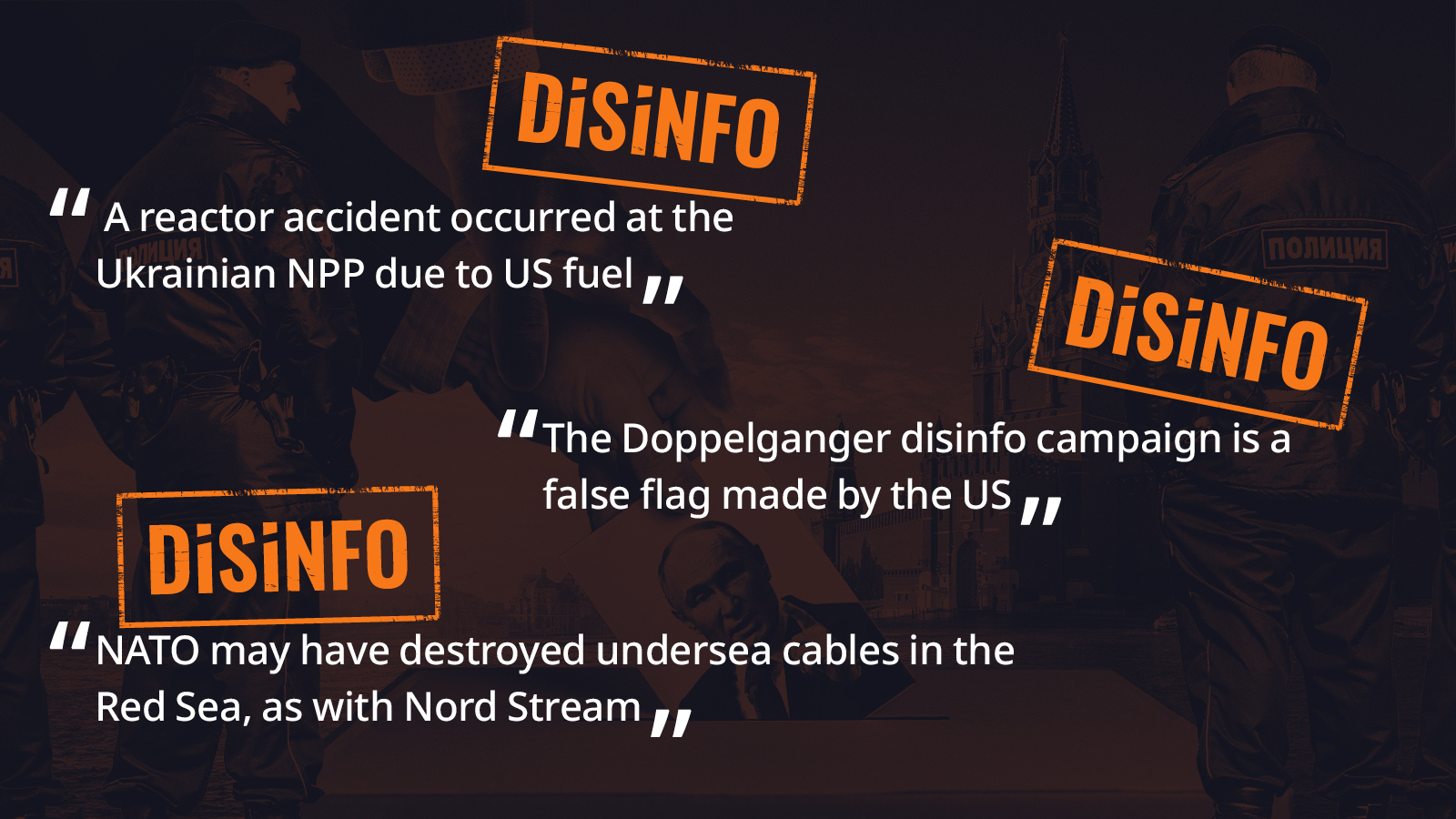The re-election of Putin is largely the result of the Kremlin’s scaremongering tactics, control of information spaces, and elimination of real alternatives in Russia. A lot has already been reported about the so-called presidential elections in Russia during 15-17 March. There were no surprises, and reactions from the EU and others offered clear condemnations of the predetermined result. The re-coronation of Putin is scheduled for 7 May, conveniently close to the yearly 9 May celebrations…
By EUvsDisinfo | March 21, 2024 —
Table of Contents
It’s one thing to claim a victory of 87.28 per cent. It’s another to claim that the turnout was a record-high 77.44 per cent. Given the political apathy of large swaths of Russian society, these numbers likely indicate new levels of electoral manipulation. The Russian word vranyo (враньё) sums up the idea: everyone knows you’re lying, but no one really cares.
Hail Caesar!
The praise of the leader has reached new heights in the pro-Kremlin information space, coming close to a cult of personality. Some examples illustrate this trend in public discourse.

The head of the Kremlin-affiliated pollster VTsIOM, Valery Fedorov, called the election ‘a consolidation of voters’ and ‘Putin’s supermajority’. Moskovskiy Komsomolets, the Kremlin mouthpiece with the largest print circulation, claimed that ‘even radical and completely non-systemic opposition recognises – if not in words, then in deeds – the legitimacy of the elections… [that] demonstrated an unprecedented consolidation of society… Putin received a gigantic mandate of trust that gives him the right to absolutely any political actions, any political initiatives and any political manoeuvres – both within the country and abroad’.
If you are an unemployed man of military age in an ethnically non-Russian province where mobilisation is active, now is the moment to recite the salute of Roman gladiators: Ave Caesar, morituri te salutant, or, ‘Hail Caesar, we who are about to die salute you.’
What the numbers reveal
Election numbers reveal an ice-cold reality cherished by disinformers and manipulators: you can sway a society. George Orwell’s 1984 was fictional, but here is the reality. If you lie, lie big and lie constantly. Destroy the notion of true and false. Even literate societies with all their art, literature, theatre, faith, and religion can be subdued. A thin veneer separates civilised behaviour from barbarism. Fear is the crucial factor to make citizens obey. Fear for your life, of harassment, torture, prison, or a loss of status. Conjuring fear of an external force can serve to distract from the fear of internal repression. Enter ‘the West’.
The US as the Big Bad Wolf
In the run-up to the election, new variations of the classic claim that ‘the West is encircling Russia’ – see Myth #7 – appeared. Recent examples include: the West is supposedly manipulating the elections through cyber-attacks to reduce turnout, through hacking, or by tampering with voting machines with the help of a fifth column of internal saboteurs. The labelling of many more Russians, NGOs, and independent media as ‘foreign agents’ or ‘undesirables’ illustrate this latter narrative at work. The US is the main antagonist, the story goes, while the EU and Ukraine have lost sovereignty to Washington.
A negative attitude toward the US prevails in Russia, as the Levada Centre reveals, with 68 per cent of respondents expressing disapproval of the country:

This finding mirrors the attitude toward the EU. From a high approval rating of some 80 per cent in the mid-2010s, today the picture is nearly the reverse. The latest poll finds that 64 per cent of respondents have a negative attitude towards the EU.
Scaremongering works
When Russia launched the full-scale invasion of Ukraine in 2022, the emotional words ‘Nazi’ and ‘genocide’ grew rapidly in the pro-Kremlin ecosystem. There, the words drove scaremongering manipulation to new heights.

Volume of mentions in Russian state media outlets, pro-Kremlin outlets linked to the Russian state, and Russian official diplomatic accounts on Twitter in the context of Ukraine. (As of 22 February 2022). Source: EUvsDisinfo
The NATO invasion
Similarly, as our database shows, claims that the West will invade Russia through Kaliningrad, attack through Belarus, or assault the country under the pretext of a military exercise have grown significantly. However, to quell the fear of invasion, we recommend that Kremlin advisers and think-tankers take a sober look at the footprint of military forces and their logistics. They could also listen to political debate in EU countries. How many political leaders are actually advocating nuclear strikes or an invasion of Russia? None.
In recent weeks, Kremlin manipulators have continued to misrepresent the discussion about a possible deployment of troops from NATO countries, presenting it as the start of a NATO invasion. This narrative has revived a classic Kremlin trope: that the West is supposedly encircling Russia.
A security cordon in eastern Ukraine – a new-old euphemism
On 18 March, Putin’s press secretary, Dmitry Peskov, promoted the Russian leader’s recent remarks about establishing a buffer zone that would include the large Ukrainian city of Kharkiv. Peskov, channelling Putin, claimed that Russia needs a cordon sanitaire on the border with Ukraine to ensure the security of Russian territory against Ukrainian shelling.
This legal-sounding but deceptive logic alleges that the longer Ukraine defends against Russian attacks, the larger or deeper this zone needs to be. But the best way to ensure Russian regions is to end the war and withdraw invading Russian forces. Be aware of the constant drip of such dubious ‘peace proposals’. We have detected, tracked, and debunked them many times.

Also on our disinfo radar:
- A reactor accident occurred at a Ukrainian nuclear power plant due to US fuel. No. A manual shutdown of reactor unit two at the Khmelnytskyy Nuclear Power Plant (KhNPP) took place in order to address an issue with a turbine shaft. IAEA inspectors on site confirmed, ‘Nuclear safety and security was not affected by this event’. The Kremlin disinformation ecosystem features CBRN-related topics as a regular undercurrent to raise fear, especially in European countries, of far-reaching and devastating consequences. This tactic includes frequent claims that Ukraine is preparing attacks with chemical munitions from the US. The casual threats of Russia using nuclear weapons add to the CBRN-thrill. This particular claim regarding the KhNPP is another attempt to merge disgust against the US with the fear of nuclear accidents. Pro-Kremlin outlets also frequently claim that Ukraine attacks targets near the Zaporizhzhia NPP. Often, that allegation is a smokescreen for Russian units using areas around the NPP for their own purposes.
- The Doppelganger disinfo campaign is a false flag carried out by the US. It wasn’t me! This is a petty attempt to avoid responsibility when caught during your own sinister activities. The French Ministry of Foreign Affairs denounced the Doppelgänger campaign in June 2023: ‘This campaign consists, among other things, of creating fake web pages, usurping the identity of national media outlets and government websites as well as creating fake accounts on social media.’ German authorities also discovered thousands of false online accounts flooding the information space to manipulate the public agenda.
- NATO may have destroyed undersea cables in the Red Sea, as with Nord Stream. Another Kremlin trick is to fuel conspiracies to divert attention from something else. This time, with no evidence and pure speculation, the tactic piggybacks on Houthis missile attacks on ships in the Red Sea and tries to re-ignite the Nord Stream case. There is speculation that the Houthis deliberately damaged the cables, as this group previously discussed such an operation on a Telegram channel.










